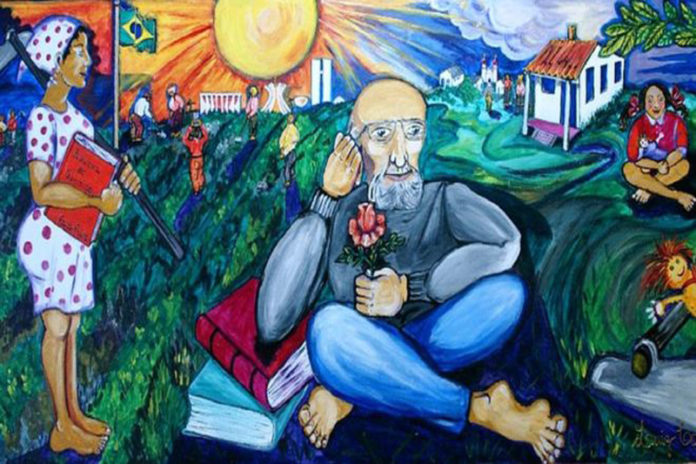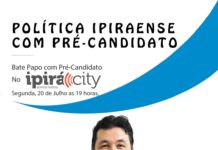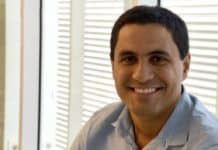Edson Veiga-from Bled (Slovenia) to BBC News Brazil
Treated by the Bolsonaro government as a scapegoat of the poor quality of Brazilian public education, the work of educator Paulo Freire (1921-1997) can be controversial. But the work of the pedagogue and philosopher, named in 2012 Patron of the Brazilian education and author of a literacy method that completed 50 years in 2013, is not ceases to be quite relevant in the world discussions on pedagogy.
Freire is studied at American universities, honored with sculpture in Sweden, name of Study Center in Finland and inspiration for scientists in Kosovo. According to a survey by researcher Elliott Green, professor of the School of Economics and Political Science in London, England, the fundamental Book of the work of the educator, ‘ pedagogy of the Oppressed ‘, written in 1968, is the third most cited in works Academics in the area of humanities around the world.
For education specialists heard by BBC News Brazil, however, the root of the controversy surrounding Paulo Freire’s pedagogy is not its application in itself-but the political-partisan use that has been made of it, historically and, more than ever, in the present day. “I’ve read most of his books. My doctoral thesis was largely based on his teachings. I have applied his method in several ways in my professional career, in practice and in research, “said Pedagogue Eeva Anttila, professor at the Helsinki University of Arts in Finland.
“The greatest advantage of its methodology is the Anti-opressiva and non-authoritarian approach, the dialogical and respectful pedagogy that it promoted. The problem is that their ideas have been used for political purposes-which, in my understanding, was never their initial purpose, “said the Finnish.
Freire became known from the beginning of the 1960 years. He developed an adult literacy method based on the contexts and knowledge of each community, respecting the individual’s own life experiences. He applied the model for the first time in a group of 300 sugarcane workers in Angicos, in Rio Grande do Norte. According to the records of the time, the literacy occurred in record time: 45 days.
Tributes to the world
World reference in quality of education, Finland has since 2007, with a space dedicated to discussing the work of the Brazilian educator. Centro Paulo Freire Finland is located in the city of Tampere. “It is a hub for those interested in Paulo Freire and his legacy to make the world more egalitarian and fair”, according to the definition of the institution itself. They published, online, three books with articles-in Finnish-analyzing the work of the Brazilian. The material had 17000 downloads.
There are similar centers of study, all baptized with the name of the Brazilian, in South Africa, in Austria, in Germany, in the Netherlands, in Portugal, in England, in the United States and in Canada. In Sweden, Freire is remembered in a public monument. Located in the suburb of Stockholm, ‘ after the bath ‘ is a work in soapstone carved between 1971 and 1976 by the artist Pye Engström. Seated side by side, seven personalities with political appeal, such as Chilean poet Pablo Neruda (1904-1973), Swedish writer Sara Lidman (1923-2004) and Norwegian sexologist Elise Ottesen-Jensen (1886-1973), are portrayed.
But the work of the Brazilian educator is far from being unanimous among the countries that usually lead the PISA ranking (acronym for International Student Assessment Program). In Singapore, which appeared in the first place in the 2018 edition of the triennial evaluation conducted by the OECD (Organization for Economic Cooperation and development) with schools known to adopt a hard-line method, BBC News Brazil sought the most Important institution of higher education in the country to know if any researcher would comment on the work of Brazilian Paulo Freire.
Professor seconded by the communication advisory from the National University of Singapore to attend the report, Kelvin Seah said that “he was not the best person to comment on Paulo Freire”. “I am not familiar with your method,” he said.
Invited to comment on what would be the most appropriate method for the Brazilian context, the specialist recommended that the managers analyze case by case. “The most appropriate method for students in a school depends on the profile of the school’s students, the previous training received by the teachers, as well as the educational and financial resources available to the school.”
Pedagogy of dialogue in the United States
In an academic article analyzing Paulo Freire’s legacy throughout the world, the professor of philosophy of education at the University of California, in the United States, Ronald David Glass points out that Paulo Freire’s merit is in the method that values “critical consciousness, Transforming and differential, which emerges from education as a practice of freedom “.
“Paulo Freire lived his life in the space of this consciousness; That’s why they’ve inspired and energized people all over the world, and that’s why their legacy will extend far beyond any horizon we can see now, “wrote the professor. “Freire was always seeking to become more humane, to make it possible for others to be more humane and, if we welcome this search with as much love and determination as it is, then a greater measure of justice and democracy will be within reach.”
Professor at the Faculty of Education of the Christian University of Texas, Douglas J. Simpson caused a certain controversy in academia by publishing, years ago, an article titled ‘ It’s Time to Engavetar Paulo Freire? ‘. “In fact, I don’t think your ideas should be archived,” he explained to BBC News Brasil. “My text was thought to attract the attention of those who think we are always using Freire. Personally, I find it important to discover again or for the first time why we need to combine a strong reflective passion ‘ freireana ‘, of respect and love, to people deprived of personal justice. ”
Simpson says that pedagogy based on dialogue is fundamental “for education and democracy to thrive, or at least survive.” He blames precisely the lack of dialogue because societies-and schools-are strongly polarized politically. “We have not been effectively taught to practice dialogue in schools, much less in governments.” For the teacher, Paulo Freire taught, above all, that we need to learn “to listen, to understand and to respect each other” and to “work together in the problems”.
Considering the Brazilian context, Simpson believes that there should be no standardization-that is, that schools should not follow all the same pedagogical method. “Schools need cultures and responsibilities that are based on a professional ethic, meritocetic policies and practices,” he said. For him, the methods are necessary, “but they must be seen as revisables, because schools, societies, works and learning are dynamic.” “Standardization in schools often leads to undue inertia, of mesmice, of sterile regulation,” he added.
In the 1970 years, the pedagogue John L. Elias, then professor at the University of New Jersey, wrote a lot about Paulo Freire. The Brazilian educator was the subject of his doctoral thesis. In a text of 1975, Elias pointed out “serious problems in the method” of the Brazilian.
“Freire’s theory of learning is subordinated to political and social purposes. Such a theory opens up to accusations of indoctrination and manipulation, “he said. “Freire’s theory of learning is doctrinal and manipulative?” he provoked.
Paulo Freire is the second figure, from the left. To the Dir, in this sculpture of 1976 of Nye Engström. The work is in Stockholm, Sweden
Elias pointed out that the Brazilian educator saw “the Third World educational systems as the main means that the oppressive elites use to dominate the masses.” “Knowledge and learning are political for Freire, because they are the power for those who generate them, as they are for those who use them,” he argued.
Professor of international and comparative education at the faculty of Professors of Columbia University in the United States, Regina Cortina has already addressed the methodology of Paulo Freire in several studies on education in Latin America, but told BBC News Brazil Who did not feel “comfortable” in commenting on the theme at the time “because of the administrative changes in Brazil”. Cortina affirmed, through the press office of the University, that it is not possible to envisage clearly “how things will follow in Brazilian schools”.
What are Freire’s ideas?
For Freire, teaching takes place from the dialogue between teacher and student, thus developing critical capacity and preparing students for their social emancipation. In the middle jargon, the Freire method is the opposite of the concept “banking” of education-the one in which the teacher “deposits” knowledge in the minds of the students. For Freire, education is built together.
The Paulo Freire method was adopted by the Government of João Goulart (1919-1976) in efforts for adult literacy. With the military dictatorship, however, the educator came to be persecuted, was arrested for 70 days and lived in exile in Bolivia and Chile. After the publication of the ‘ Pedagogy of the Oppressed ‘, in 1968, Freire was invited to be a visiting professor at Harvard University in the United States.
Recognized since 2012 as the patron of Brazilian education, Paulo Freire is considered the Brazilian most often laureate with titles of Doctor honoris causa causa by the world. In total, he received tributes in at least 35 universities, between Brazilian and foreign, such as the University of Geneva, the University of Bologna, the University of Stockholm, the University of Massachusetts, the University of Illinois and the University of Lisbon. In 1986, Freire received the Education for Peace award, granted by Unesco, the United Nations Educational, Scientific and Cultural Organization.
There are educational institutions that follow the Paulo Freire method in several countries. This is the case of Revere High School, a school in Massachusetts, which in 2014 was evaluated as the best public institution of high school in the United States. In Kosovo, a group of young scholars created a project of citizen science inspired by the critical pedagogy of the Brazilian. Participants receive a kit to monitor environmental conditions and, thus, together, press the government for improvements in the area.
“I believe it would be great for pedagogy at any school in any country to depart from Freire’s thought,” said Finnish pedagogue Anttila. “Especially in Brazil, given the current political situation and the history of the country.” She says that a teaching method, to work well, needs to take into account the life situations of the students. “I don’t believe in authoritarian pedagogy. Classes don’t need to be authoritarian. It takes dialogue, discussion, negotiation, exploitation. Build knowledge so that there is ability to express ideas and listen to others. Here’s the key to democracy. And democratic education is the only way to safeguard a democratic society, “he said.















